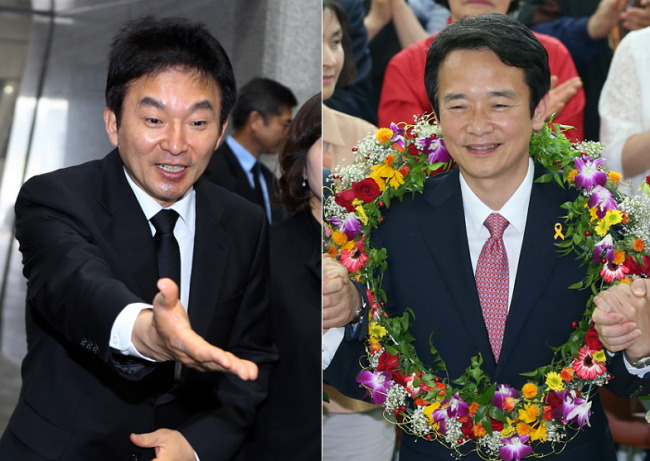Voters send warnings to both parties in wake of Sewol
By Korea HeraldPublished : June 5, 2014 - 20:55
Voters sent both warnings and encouragement to the ruling and main opposition parties through Wednesday’s local elections, calling for bipartisan efforts following the April 16 ferry disaster and a focus on enhancing people’s lives, analysts said Thursday.
Although the opposition New Politics Alliance for Democracy bagged nine gubernatorial seats, one more than those clinched by the Saenuri Party, there was no clear winner in the elections, which put both parties in a soul-searching mode, they said.
“In Wednesday’s polls, voters did not give any overwhelming support for any of the parties, perhaps because they were still recovering from the shock from the maritime disaster,” said Lee Jung-hee, politics professor at Hankuk University of Foreign Studies.
“Through the elections, voters may have wanted to convey their hopes that both parties should be reborn and join hands to emerge from the disaster and move the country forward.”
Throughout the election campaigns, the government’s bungled response to the ferry disaster proved to be the main variable working against the ruling party.
Although the opposition New Politics Alliance for Democracy bagged nine gubernatorial seats, one more than those clinched by the Saenuri Party, there was no clear winner in the elections, which put both parties in a soul-searching mode, they said.
“In Wednesday’s polls, voters did not give any overwhelming support for any of the parties, perhaps because they were still recovering from the shock from the maritime disaster,” said Lee Jung-hee, politics professor at Hankuk University of Foreign Studies.
“Through the elections, voters may have wanted to convey their hopes that both parties should be reborn and join hands to emerge from the disaster and move the country forward.”
Throughout the election campaigns, the government’s bungled response to the ferry disaster proved to be the main variable working against the ruling party.

But the election results suggested that the political impact of the disaster was limited. Some analysts said that voters wanted to give President Park Geun-hye momentum to push for her drive to reform the social safety system. Others argued that voters expressed their views that political circles, regardless of their political affiliations, were not free of blame for the disaster.
“Of course, the Park administration first should take the basic responsibility for the inept response to the ferry disaster and poor national safety system. But can we say that the opposition parties were free from that, other vested interests were free from that? That was perhaps how voters viewed the situation,” said Lee.
Yun Seong-yi, politics professor at Kyung Hee University, said that the opposition’s emphasis on voters’ “judgment” of the government’s incompetent handling of the disaster might have backfired.
“The opposition parties did not give enough trust to voters about how they would have done in the government’s shoes or how they would improve the safety system if they were in office. They just repeatedly stressed the need to punish, punish and punish the government,” he said.
“With the mantra of ‘judgment’ against the ruling bloc, the supporters of the opposition bloc might have felt happy. But it might not have appealed to those (undecided voters or centrist voters). They should have been clearer about their vision, plans, etc.”
Looking at the election results, some argued that the NPAD virtually lost the elections despite the political pendulum having swung in its favor due to the repercussions of the ferry disaster and declining public support for President Park.
The NPAD lost in crucial races for Gyeonggi governor and Incheon mayor to the ruling party candidates.
“Some 16 months have passed by since the president took office. As more time goes by, the opposition should be in a more advantageous position as evidenced in the past elections. But the NPAD did not perform well this time,” said Lee Jun-han, politics professor at Incheon National University.
“The election result shows the opposition party was not competent enough (to win the hearts of the voters) and failed to put forward alternative policies that could distinguish itself from the ruling party, and failed to read what people at the grassroots (level) really want.”
Lee also pointed out that the elections showed that regionalism ― in which voters in particular regions have long favored particular parties ― still remained a strong factor.
“To be candid, I don’t see a significant message voters would like to send to the political circles as regionalism still was strong in the way people voted here,” he said.
One exception was South Chungcheong Province, where a liberal candidate was picked, Lee said. The province has been regarded as a stronghold for the now-defunct conservative Liberal Forward Party.
“Chungcheong residents appeared to have felt unhappy and slighted by the conservative political bloc with the disappearance of the Liberal Forward Party. That is perhaps a reason why a liberal candidate clinched the gubernatorial seat there,” said Lee.
Above all, the most prominent figure in the local elections was Seoul Mayor Park Won-soon, analysts said. Park has maintained a comfortable lead against ruling party heavyweight Chung Mong-joon. The analysts said that Park’s “people-oriented” leadership style has appealed to the public.
“The biggest winner in the elections is Mayor Park, who has paved the way toward the next presidential election. He has shown what voters want ― a close relationship with people, policies focused on enhancing people’s lives and sincerity. These are attributes that are rarely found in professional politicians,” said Yoon Pyung-joong, political philosophy professor at Hanshin University.
“These attributes are actually in contrast to the Park government’s aloof, incommunicative image.”
By Song Sang-ho (sshluck@heraldcorp.com)
-
Articles by Korea Herald






![[From the Scene] Monks, Buddhists hail return of remains of Buddhas](http://res.heraldm.com/phpwas/restmb_idxmake.php?idx=644&simg=/content/image/2024/04/19/20240419050617_0.jpg&u=20240419175937)








![[From the Scene] Monks, Buddhists hail return of remains of Buddhas](http://res.heraldm.com/phpwas/restmb_idxmake.php?idx=652&simg=/content/image/2024/04/19/20240419050617_0.jpg&u=20240419175937)

![[KH Explains] Hyundai's full hybrid edge to pay off amid slow transition to pure EVs](http://res.heraldm.com/phpwas/restmb_idxmake.php?idx=652&simg=/content/image/2024/04/18/20240418050645_0.jpg&u=20240419100350)

![[Today’s K-pop] Illit drops debut single remix](http://res.heraldm.com/phpwas/restmb_idxmake.php?idx=642&simg=/content/image/2024/04/19/20240419050612_0.jpg&u=)